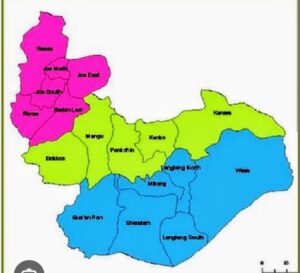

By Dada Ahmed.

The map of Plateau state.
(C) Google/Research Gate.
After yet another round of deadly attacks on communities in Plateau State, leaving scores of innocent people dead,the urgency for a genuine path to peace has never been greater. The haunting echoes of violence continue to torment not only the peace-loving people of Plateau but also the conscience of Nigeria and the watching global community. Once again, the bitter reality has come into focus showing that peace in Plateau remains fragile, but the desire for healing and unity must not be abandoned.
Plateau, a geopolitical entity often called the “Home of Peace and Tourism,” has ironically become synonymous with recurring ethnic and communal strife. What began years ago as minor disputes over land, grazing paths, and local governance has morphed into a devastating cycle of fear, vengeance, and bloodshed.
President Bola Tinubu expressed deep sorrow over the recent killing of over 40 people in Plateau, condemning the attacks and offering condolences to Governor Caleb Mutfwang and the people. Through his Special Adviser on Information and Strategy, Bayo Onanuga, the President called for firm political will and bold steps to end the violence and restore lasting peace.
He urged Plateau’s residents to embrace unity across religious and ethnic divides, calling on spiritual, community, and political leaders to break the cycle of revenge that has long tormented the region. Tinubu also directed security agencies to investigate the killings and bring those responsible to justice, insisting that the time for impunity must end.
Observers agree that Tinubu’s words reflect a national frustration with a crisis that has persisted for decades. Areas such as Jos North, Barkin Ladi, Riyom, Bassa, and Bokkos have suffered repeated eruptions of violence since the early 1990s.
With its diverse ethnic makeup,the Berom, Afizere, Anaguta, Hausa, Fulani, and many other tribes,Plateau should have been a model for peaceful coexistence. Instead, analysts say, identity politics, indigene-settler divisions, and perceived political exclusion have fueled mistrust and periodic conflict.
The social toll has been staggering. Hundreds of lives lost. Families were displaced and many communities turned to ghost towns with many children grown up in IDP camps. They are cut off from education, healthcare, and belonging. Suspicion defines social interaction and trust is a rare commodity.
Economically, the violence has created a serious threat to Plateau’s promise. Once a vibrant hub for mining, agriculture, and tourism, the state now suffers from insecurity, poverty, and a loss of investor confidence. Abandoned farms mean food shortages. Rising youth unemployment leaves young people vulnerable to manipulation by warlords pushing ethnic or religious agendas.
Politically, the crisis has been exploited. Some politicians have weaponized ethnic identity and religion to win votes, deepening divisions rather than healing The wish there could be an improved coordination in security responses continue to boost public confidence in government.
The recent coordinated attacks in Bokkos and Bassa shouldn’t be dismissed as just another headline. The scale and coordination raise urgent questions: Who is behind the violence? Why is justice always delayed? Why do the victims remain unheard?
A true solution must begin by confronting the root causes,land ownership disputes, marginalization, and the collapse of justice. These problems demand more than soldiers and relief materials; they require lasting institutional reforms and political courage.
Traditional rulers must rise above tribal loyalties to champion peace. Religious leaders should preach healing, not hatred. The media must report responsibly, avoiding inflammatory language and highlighting solutions.
Security must be localized and intelligence-driven. Community involvement is essential. Trained and monitored vigilante groups can play a role but must operate within legal limits to avoid abuse.
Justice must be fair and swift. No one,regardless of tribe, status, or political affiliation,should be above the law. Without justice, peace cannot take root.
A Plateau Truth and Reconciliation model could be explored. Spaces for dialogue must be created, peace clubs established in schools, and youth encouraged to build cross-community relationships. Healing must be intentional and inclusive.
Above all, the people of Plateau must reject violence. They must say, with one voice: “Never again.” Their children deserve a future free from fear. The world is watching. History is recording. Will Plateau remain a land of conflict or reclaim its destiny as Nigeria’s true “Home of Peace and Tourism”?
Members of the political class in Nigeria remain firm in their belief that, until much drastic action is taken against killings in Plateau state, looking critically at the main causes of the crisis, with genuine determination to end it on a final note,the path to peace in Plateau state will remain unfinished.
Ahmed, one time Assistant Editor in Chief in News Agency of Nigeria,NAN,is the publisher of The Reporters


